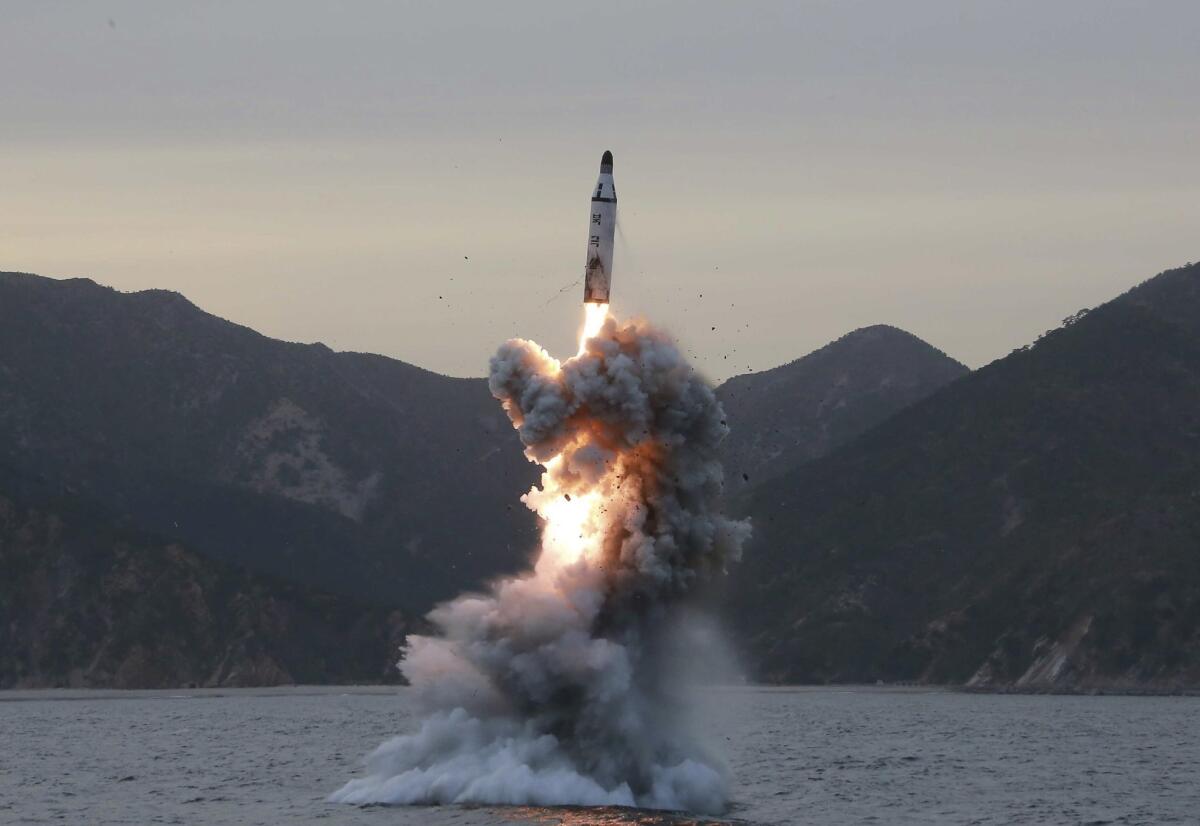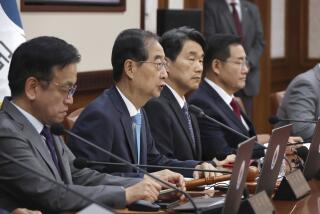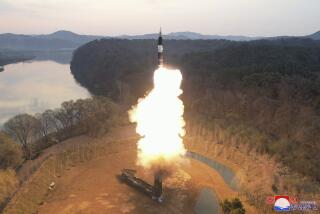North Korea launches missile into waters near Japan days before nuclear talks set to resume with U.S.

- Share via
SEOUL — North Korea fired a ballistic missile Wednesday that landed in the Sea of Japan, also known as the East Sea, less than 200 miles from the Japanese coast, according to the South Korean military and the Japanese coast guard.
The launch came a day after North Korea said it would resume nuclear talks with the U.S. this weekend. The last time a North Korean missile landed in Japan’s exclusive economic zone was November 2017.
The missile, which flew 280 miles and reached a height of 565 miles, originated in the waters northeast of Wonsan, North Korea, and may have been launched from a submarine, according to the South Korean Joint Chiefs of Staff.
In July, North Korean state media published photographs of leader Kim Jong Un at a shipyard inspecting a newly built submarine that it said would boost the country’s military capabilities.
A senior U.S. official told CNN the White House was aware of reports of the launch and was monitoring the situation and consulting with allies.
North Korea has conducted more than 10 test launches of missiles or projectiles since talks with the U.S. fell apart during President Trump’s February summit with Kim in Vietnam.
Trump has said repeatedly that those tests were “standard” and not a threat or a breach of trust between himself and Kim.
But Trump’s recently ousted national security adviser, John Bolton, said in a speech Monday that each test was a violation of United Nations Security Council sanctions imposed on North Korea.
“When the United States ... says we really don’t care, other countries can draw the conclusion that they don’t really care about the sanctions,” he said at the Center for Strategic and International Studies in Washington.
Bolton, a longtime hawk on North Korea who has advocated for military intervention, said Kim had not made a decision to give up nuclear weapons.
In announcing the resumption of working-level talks, Choe Son Hui, North Korea’s vice minister of foreign affairs, said in a statement Tuesday that she expected they would “accelerate the positive development” between the two countries.
A U.S. State Department spokeswoman confirmed the same day that there were plans for high-level delegations from the United States and North Korea to meet “within the next week.”
The announcement followed a recent statement from Kim Kye Gwan, a North Korea Foreign Ministry advisor, blaming the U.S. for the stalled talks while appearing to single out Trump.
“I came to know that President Trump is different from his predecessors in political sense and decision while watching his approach to the DPRK,” he said, using his country’s official name, the Democratic People’s Republic of Korea. “So I would like to place my hope on President Trump’s wise option and bold decision.”
The negotiations would be aimed at bridging the gaping difference between the two sides that became clear at the Vietnam summit. North Korea was only willing to offer up the dismantling of its main nuclear complex, Yongbyon, while Trump said the U.S. wanted to discuss other secret facilities.
North Korea demanded immediate relief from the most severe economic sanctions imposed as punishment for its nuclear and ballistic missile testing. The U.S. has insisted denuclearization must come first.
Bolton had said North Korea should hand over its nuclear weapons and fissile material to the United States the way Libya did in early 2004 in exchange for normalized relations and relief from sanctions. North Korea has bristled at the suggestion, pointing to Libya’s eventual regime collapse and leader Moammar Kadafi’s demise.
More to Read
Sign up for Essential California
The most important California stories and recommendations in your inbox every morning.
You may occasionally receive promotional content from the Los Angeles Times.











